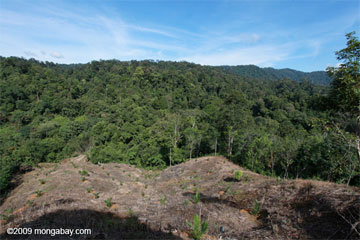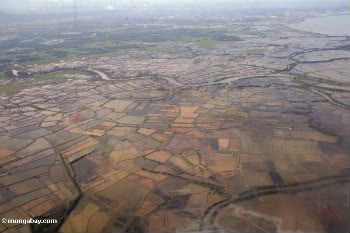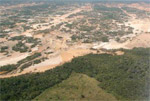The article originally listed Candlewick Press as a publisher to avoid due to rainforest destruction, however, the Rainforest Action Network (RAN) has since changed their evaluation of Candlewick Press to ‘recommended’ given information the publisher has now shared with RAN about its paper sourcing policies.
Everyone knows books are made of paper, but few think of where that paper comes from. However, two new reports may change that. Both the Rainforest Action Network (RAN) and the World Resources Institute (WRI) have found that some paper used in books, including popular children’s books, is linked to forest devastation in Indonesian, even targeting endangered trees that have been harvested illegally.
Books and rainforest destruction
The activist group RAN has found that a number of children’s books are linked to destruction of rainforests in Indonesia, which threatens an incredible variety of species from orangutans to tigers and emits significant amounts of greenhouse gases. The report find that popular titles such as Where the Wild Things Are and Baby Einstein are complicit in rainforest destruction. To help consumers, RAN has a guide that ranks eleven of the US’s largest children’s books publishers in terms of impact on forests.
“Kids are starting to make holiday wish lists this week. This guide is a tool to help book-loving families avoid kid’s book publishers that are linked to rainforest destruction,” said Lafcadio Cortesi of Rainforest Action Network. “The good news is that many of the country’s largest publishers, six out of the eleven in our survey, are taking decisive action to help protect Indonesia’s endangered rainforests.””
 Deforestation on the Indonesian island of Sumatra. Photo by: Rhett A. Butler. |
The RAN consumer guide recommends that consumers purchase books from publishers that have pledge publically to phase out controversial paper suppliers from Indonesia; these include: Hachette Book Group, Houghton Mifflin Harcourt, MacMillian, Penguin Group, Simon and Schuster, Candlewick Press, and Scholastic. The guide further recommends that consumers avoid publishers who have not made “no commitment to protecting […] endangered rainforests”, such as Disney Publishing Worldwide and HarperCollins.
Today just under half of Indonesia remains covered in forest. Between1990-2005, the country lost 28 million hectares of forest, pushing Indonesia to become the world’s third largest emitter of greenhouse gases after industrial giants, China and the US.
Illegal logging for book paper
The World Resources Institute (WRI) has found that not only do some books include pulped Indonesian forests, but even illegally-harvested endangered species.
Analyzing 32 imported paper products analyzed, WRI found that three of them included sources that are likely illegal under the 2008 amendment to the US Lacey Act. The new amendment makes it so that any imported wood, or wood products, harvested illegally in its native country, such as Indonesia, now falls under US law as well.
According to the analysis, two books—one children’s book cover and one large coffee table book—contained fiber from the ramin hardwood tree ( Gonystylus spp) in Indonesia. Yet ramin trees have been protected by CITES since 2003, making this an illegally harvested species. Another children’s book revealed wood from an Indonesian mangrove tree, yet mangroves are protected in Indonesia. All three of these products could potentially fall under the Lacey Act.
According to the International Tropical Timber Organization the Lacey Act means that “anyone who imported, exported, transported, sold, received, acquired or purchased the wood products made from that illegal timber, who knew or should have known that the wood was illegal, may be prosecuted for violation.”
 Mangroves felled in Indonesia replaced by rice fields. Photo by: Rhett A. Butler. |
The WRI says that US importers must apply ‘due care’ in their supply chain, or risk penalties—including possible jail time and up to half a million dollars in fines—under the Lacey Act.
Last year Gibson Guitars factory was raided for reportedly using illegal wood from Madagascar in its musical instruments, while a shipment of wood from Peru was confiscated in Florida for violating the Lacey Act.
Boycott all paper?
However a new group on Facebook is suggesting a different solution for consumers. According to the Great American Paper Boycott, Americans should boycott all paper products, save those that are 100% post consumer recycled material or from farm grown fiber. For book-buyers, this means buying used or acquiring a Kindle.
In its statement, the new group says that a boycott is the only way to pressure paper companies to end their “radical environmentally destructive practices,” warning that paper companies “are quickly transferring all their wood chipping operations to the third world instead of opening up their businesses to American farmed fibers such as hemp.”
Related articles
Corporations, conservation, and the green movement

(10/21/2010) The image of rainforests being torn down by giant bulldozers, felled by chainsaw-wielding loggers, and torched by large-scale developers has never been more poignant. Corporations have today replaced small-scale farmers as the prime drivers of deforestation, a shift that has critical implications for conservation. Until recently deforestation has been driven mostly by poverty—poor people in developing countries clearing forests or depleting other natural resources as they struggle to feed their families. Government policies in the ’60s, ’70s, and ’80s had a multiplier effect, subsidizing agricultural expansion through low-interest loans, infrastructure projects, and ambitious colonization schemes, especially in the Amazon and Indonesia. But over the past two decades, this has changed in many countries due to rural depopulation, a decline in state-sponsored development projects, the rise of globalized financial markets, and a worldwide commodity boom. Deforestation, overfishing, and other forms of environmental degradation are now primarily the result of corporations feeding demand from international consumers. While industrial actors exploit resources more efficiently and cause widespread environmental damage, they also are more sensitive to pressure from consumers and environmental groups. Thus in recent years, it has become easier—and more ethical—for green groups to go after corporations than after poor farmers.
‘Green’ paper company allegedly complicit in land grabs against Chinese communities
(10/07/2010) Finnish paper company, Stora Enso, may lose its green and socially responsible reputation over a new report by Rights and Resources International (RRI) and the Rural Development Institute (RDI). The report finds that the company broke Chinese laws and even worked with middlemen who physically threatened local farmers, all in an effort to lease 120 thousand hectares for a vast eucalyptus plantation in southern China. Just last year, a lawyer working to defend farmers landed in a hospital after being beaten for his involvement.
Children’s books about rainforests linked to rainforest destruction
(06/01/2010) Purchasing a book children’s book may be directly causing deforestation of biodiverse and carbon-heavy rainforests, according to a new report by the Rainforest Action Network (RAN). In a discovery that highlights the irony of the issue, RAN even found children’s books about protecting rainforests contained fiber from Indonesian forests.